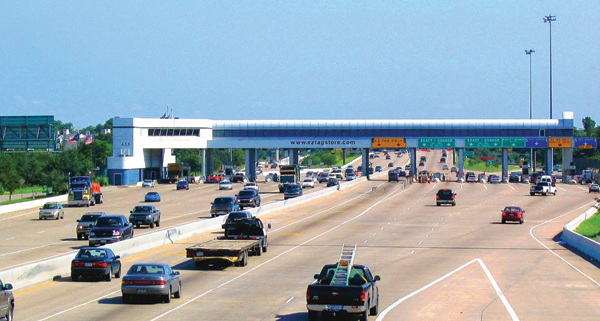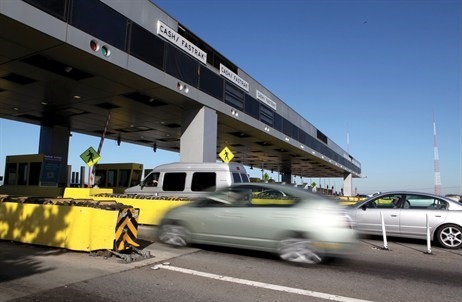The North Carolina Turnpike Authority's JJ Eden talks about developments within the Alliance for Toll Interoperability.
The Alliance for Toll Interoperability grew out of the US State of North Carolina's moves to introduce modern, Open Road Tolling (ORT) and the identification of revenue 'holes' when it came to out-of-state customers. Initially, the Alliance looked to achieve some form of common ground when it came to the use of transponders used by different agencies but alighted on video-based tolling as the most suitable way forward.The North Carolina Turnpike Authority's JJ Eden, who leads the Alliance, explains: "We had our first discussions at the
"Recognising that in the short term we would be unable to persuade or force vendors to deliver a suitable tag-based interoperability solution, and that Electronic and All-Electronic Toll Collection [ETC/AETC] use video for enforcement, made video an obvious solution," Eden continues.
North Carolina, he notes, by virtue of never having had a toll road in modern times, was the proverbial clean-sheet location.
Advocacy position
The Alliance, he continues, does not set out to be a trade association but rather an advocacy group for a shared set of technology standards. What originally started as a domestic organisation has now grown to include a number of Canadian tolling authorities which share geographic boundaries with US states. A Phase One specification, which deals with how to share data, how to structure networks and optical character reading and license plate recognition issues, has already been drawn up. Phase Two specifications, which will deal with money-sharing issues, are a work in progress."We've done a lot of work with E-ZPass and those states such as Florida, Texas and California where there is already some form of interoperability in operation to determine the good and the bad, what works and what doesn't," Eden continues.
"On the vendor side, it became apparent that nobody was giving them direction; each time an agency issues a request for proposals the vendors respond to meet the specification but no-one was telling them that interoperability was desired or even a priority." Video was a natural jump for any one of a number of additional reasons, Eden states.
"Many video systems are due for upgrade and even if by some miracle an RFID or GPS-based charging or tolling system became mandated, video would still be needed for verification until every vehicle on the road was suitably equipped.
"It also allows agencies to come in when they're ready. Florida, for example, has just gone over to sticker tags but there's nothing to stop it from going to video farther down the road."
He dismisses the idea that a move to video-based tolling is only designing in obsolescence: "We're not relying on it as the sole technology; we're not recommending that it replace RFID or GPS if and when one or the other comes about, for instance. There'd be a period of between five and 15 years before any new RFID or GPS solution became workable. You can plan for that. Even if you installed video over a three- to four-year period, you'd still have a decade of useful life out of the technology."
The issue of ubiquity
Ubiquitous technologies, says Pat Jones, the IBTTA's Executive Director and CEO, have the advantage that no-one has to go out and especially acquire them: "Cell phones, for instance, have that advantage of mass-market penetration and we can only guess at where the technology will be in a few years' time. I'm not especially advocating pursuing the use of cell phones for tolling but could tolling be another application that they could host? If issues such as latency can be resolved I don't see why not.
"E-ZPass has been in existence for 15 years. In that time, approximately 18 million transponders have been deployed. In the same geographic area in which they're operational, the number of cell phones in use is many times greater.
"In many ways, we could be thinking too narrowly about how to deal with interoperability. We tend to rely on historical technologies but there could be a relatively simple disruptive technology out there which would give us a solution."
Although he sees the recent release of the National Transportation Infrastructure Financing Commission's report as hugely significant because of its promotion of the idea of a national VMT charging scheme (and, therefore, its potential precipitation of a national interoperability standard), Jones also perceives "an exquisite reluctance" on the part of senior policy makers to embrace its findings.
"They're in a huge state of denial. On the one hand, people are saying that there should be no increase in the level of gas tax. On the other, the Obama Administration has said that it will not pursue VMT-based charging.
I can only explain that as a communications failure between the White House and the Department of Transportation.
"We need much more education. AASHTO, for instance, has just issued its latest bottom-line report, which states that the US needs a $225 billion-a-year increase in funding for highway and transit improvements. In total, it's looking for $1.4 trillion over the course of the next Transportation Bill.
"That's just one report but it echoes the findings of many other studies. We're talking huge numbers when it comes to the funding disparity and yet there are very few people in senior policy positions willing to say, 'Yes, we'll do this.'
"The whole situation is frustrating and leaves me at a bit of a loss."
Broadening the outlook
ETC has brought considerable change in terms of business models to the tolling sector. ORT is going to have a similar effect. The next step is national or continental interoperability."There will be in-vehicle technology as standard in future and it'll probably combine a number of applications such as tolling and parking," says Eden. "Will it be 5.9GHz DSRC or GPS? I don't know. But public demand for convenience will drive its adoption. I used to carry with me several hundred dollars every time I travelled, just to cover expenses. My daughter doesn't. We already have with us the cashless generation. Time is valuable and people don't like stopping.
"Is there a space for the nav system manufacturers to become involved? Possibly. The scene is set for a classic 'Who will win?' battle in the Betamax/VHS mould. I choose that phrase deliberately because I'm not convinced that it'll be the best technology that'll win. What'll be the decider is who grabs the greater market share the quickest.
"I used to think that the automatic choice for future tolling was 5.9GHz but if the likes of
Where multimodal travel options are more limited, the use of increasingly intelligent nomadic devices may be less relevant and Eden sees space for, for instance, key fob-type solutions to emerge (see Sidebar, "The issue of ubiquity").
"I think that things will evolve, rather than there being a revolution," he says. "Current GPS devices aren't capable of two-way communication but I see that public demand could change all that. We're already seeing things shift, with out-of-state travellers asking if they can use their existing tags in other agencies' areas."
Common currency
With everyone becoming a customer, there arises the issue of how to collect fees across state lines."We're also working on that," Eden continues. "There are a lot of back office issues to work out. That includes databases, not just technologies, and we're working with the DMV and other licensing agencies. There is a precedent - with E-ZPass, we thought that technology selection would be the difficult part but as it turned out it was the service centre issues that were the hardest to resolve. Also, there's a need to write business rules that are flexible enough to adapt to new and changing technologies.
"Speaking to European tolling agencies, it's clear that these problems are universal. We're not looking to mandate a standard but if there's enough critical mass I can see that forcing adoption of a de facto standard. For example, if 5.9GHz were to be mandated, then the swap-out of technologies across the US would be a huge undertaking and there would be a significant infrastructure investment involved. We need ways of dealing with the elephant one bite at a time."
The IBTTA is convening and organising an event to look at issues relating to interoperability. The future of tolling: ORT and the path to interoperability, hosted by the Tampa-Hillsborough Expressway Authority, will take place at the Grand Hyatt, Tampa Bay, Florida, 14-16 June 2009. Interested parties can register online at the IBTTA website.RSS












